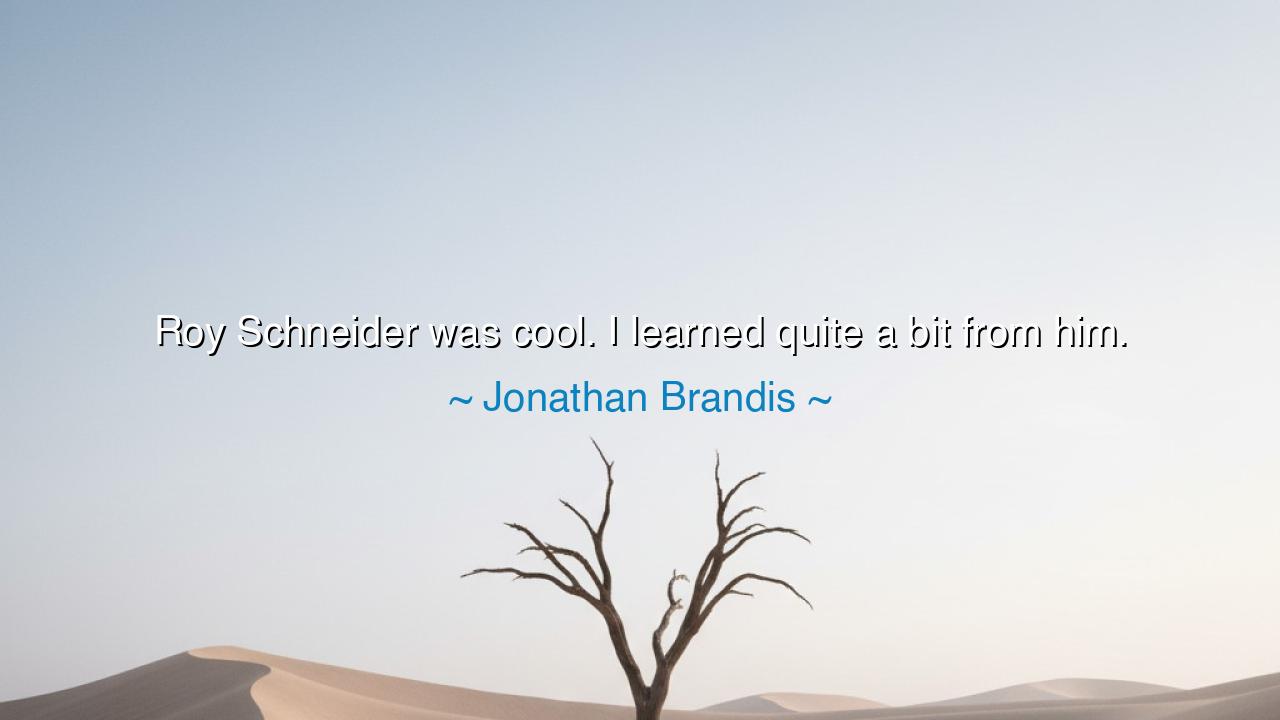
Roy Schneider was cool. I learned quite a bit from him.






In the words of Jonathan Brandis, we find a profound reflection on the power of mentorship, admiration, and the wisdom that can be passed between generations. To call Roy Schneider "cool" is not simply to praise his demeanor, but to acknowledge the depth of his character, his wisdom, and the influence he had on those around him. In this simple statement, Brandis speaks to the transformative power of those who lead not through words alone, but through their actions, their character, and their ability to inspire. The word "cool" here carries a weight that transcends surface-level praise. It embodies respect, the quiet understanding that there is much to learn from someone who moves through the world with a sense of composure, wisdom, and a genuine humility that makes them a guide to others.
This relationship of mentor and mentee is timeless, echoing the bonds formed between the ancient philosophers and their disciples. Think of Plato and Aristotle, two towering figures whose teacher-student relationship shaped the course of Western thought. Aristotle, a young man eager for knowledge, learned much from his teacher, Plato, who in turn was influenced by the wisdom of Socrates. Plato's influence was not merely intellectual; it was a way of being, a way of seeing the world. Similarly, Brandis’s words reflect that same deep reverence for someone who, by their very presence, leaves an indelible mark on another’s life, just as Socrates did for Plato.
Consider the mentor not only in intellectual pursuits but in practical life, much like the great warriors of old. The mentor of a warrior, the elder who had lived through countless battles, knew more than just the art of war; they understood the complexities of courage, the importance of strategy, and the quiet strength required to lead. In the Roman legions, for example, younger soldiers learned from their elders, who had fought in the heat of battle and understood the deeper lessons of life and survival. These mentors did not simply teach tactics; they taught resilience and wisdom, passing on their insights through example rather than mere instruction. Roy Schneider, as Brandis’s mentor, likely embodied these same qualities: someone who, through his presence and experience, was able to inspire and teach not by words alone, but by how he moved through the world with quiet strength.
The beauty of Roy Schneider’s influence, as Brandis expresses, lies not in the grandiose, but in the small, everyday actions that make a lasting impression. Often, it is not in the loud declarations or the overt teachings that a person’s true character is revealed, but in the way they interact with the world and those around them. Jonathan Brandis speaks not just of learning technical skills or professional knowledge, but of something more profound—the way one carries oneself, the grace and composure with which they meet the world. Schneider, through his calmness and presence, was able to impart a deeper understanding of life, one that transcended the realm of performance and touched on the human condition itself.
We see this in the lives of many revered figures. Take Mahatma Gandhi, for example, who became a mentor to countless individuals, not through teaching in the traditional sense, but through his actions—his commitment to non-violence, his perseverance in the face of adversity, and his ability to live in accordance with his values. His followers learned not from what he said, but from what he did. Similarly, Roy Schneider, by his example, shaped the way others understood how to live, how to work, and how to be a person of integrity in the world.
The lesson here is clear: true mentorship comes from those who live their truth with quiet strength and consistency. We all have the opportunity to be mentors in our own lives, whether through our work, our relationships, or the simple example we set each day. Like Schneider, we can choose to live with composure, to approach challenges with a sense of calm and determination, and to pass on wisdom not through forceful instruction, but through how we act and the way we treat those around us. True wisdom is not found in the loudest voices but in the stillness of those who, through their example, teach us the most important lessons of life.
So, let us remember the words of Jonathan Brandis as a call to emulate those who live with purpose, grace, and integrity. In the world we inhabit, it is not always the loudest who leave the greatest mark, but those who, through their actions and presence, teach us the most. Let us strive to be like Roy Schneider, individuals who, through their coolness, their wisdom, and their humble influence, shape the lives of those who walk beside them.






AAdministratorAdministrator
Welcome, honored guests. Please leave a comment, we will respond soon